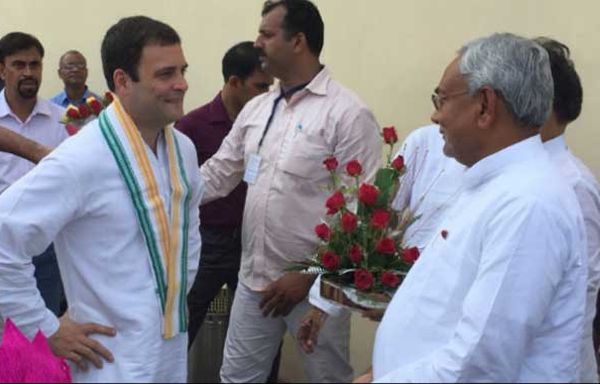'The Congress has forgotten how to mobilise people on political issues,' says Aakar Patel.

As the BJP swiftly picks up state after state, the Congress response has been fear and panic.
Bihar slipped away despite the Congress having, according to Rahul Gandhi, prior knowledge of Nitish Kumar's defection.
If they knew, why were they helpless? It is difficult to understand.
Goa went similarly and though the Congress was better placed there, having won more seats, it waited. And waiting while faced with a party of the talent and energy and hunger of the BJP was a fatal error.
In Gujarat, Shankarsinh Vaghela's exit has triggered another round of chaos and six Congress MLAs have quit, jeopardising Ahmed Patel's Rajya Sabha election.
The party's response has been to suspect all its remaining MLAs and send them to Karnataka, one of the few states it controls.
The strange thing is that Gujarat is a state where the BJP has performed really poorly, according to Gujaratis themselves.
It is the BJP that should be concerned about losing its popularity.
In the last couple of years Gujarat has seen the following major agitations under which lakhs of people have been mobilised.
The Patidar agitation for reservations led by Hardik Patel, the counter agitation of OBC Kshatriyas led by Alpesh Thakor, the Dalit revolt after the Una episode led by Jignesh Mewani, the anguish of diamond merchants and textile workers after demonetisation and rallies by lakhs of traders in Surat after the imposition of GST.
Though these issues have been the direct result of BJP policies, all these agitations have happened without Congress leadership. They have thrown up new leaders like the three young men named above, or they have been leaderless.
This shows that the Congress has forgotten how to mobilise people on political issues. This is strange because some of Gandhi's most successful agitations, like the Bardoli Satyagraha, were in Gujarat.
The Congress party in Gujarat has consistently got over 30% of the vote. However it cannot get that extra three or four percentage points that are the difference between defeat and victory.
And that can happen if it is able to capitalise on one of the issues by mobilising people around it.
Its inability to mobilise despite all the agitations is the reason the Gujarat BJP remains comfortable.
The BJP is thought to be invincible, but no party can be in democratic politics.
In Karnataka, the BJP is actually on the defensive. The wily Congress chief minister Siddaramaiah has used Indian style political tactics to keep the Hindutva party busy.
He is using an anti Hindi agitation in Bangalore, a subject on which BJP is vulnerable because of RSS preference of Hindi. The local BJP must stay silent or suffer damage.
The other issue is that of the Lingayat community's internal demand that it be treated as a separate religion outside Hinduism.
Siddaramaiah has offered to send a recommendation of separation of the faith to the Centre, if the Lingayats want him to. This seemingly innocent offer has set the cat among the pigeons.
The problem of the BJP is that the community strongly backs the BJP (party leader B S Yeddyurappa is a Lingayat) but the BJP-RSS will not give Lingayat separatism legitimacy. Again, it must remain silent or suffer damage.
Siddaramaiah has also disarmed the BJP's nationalism by turning the focus to subnationalism issues like a flag for Karnataka.
All of this tells us that it is possible for Congress, and other parties, to offer a political challenge.
How can political parties in India mobilise their supporters in a time of trouble?
The Congress might be about to get a lesson in that from one of India's sharpest politicians.
Bahujan Samaj Party leader Mayawati has resigned from the Rajya Sabha after claiming she was not allowed to speak. Whether her anger is real or not, the action is deliberate.
It will mean she will go to the ground and try to build back support she has lost.
According to those who follow local politics, the BJP succeeded in breaking up of the unified Dalit identity into jatis and sub castes and going after the Dalit groups Mayawati had ignored. Her party has been getting about 20 to 25% of the vote in UP.
In a multiple cornered fight so long as all parties were in that zone she had a reasonable chance of victory.
But Amit Shah's superb ability to build caste alliances has given the BJP overwhelming numbers that neither the Samajwadi Party (which is stuck at 29% of the vote) nor the BSP can match.
The only way to change that is to mobilise people. Mayawati knows that.
The Congress, after this moment of panic has passed, should take a deep breath and think about how to do it.
Aakar Patel is Executive Director, Amnesty International India. The views expressed here are his own.
- You can read Aakar's earlier columns here.
IMAGE: Congress Vice-President Rahul Gandhi, left, with Bihar Chief Minister Nitish Kumar before the Mahagatbandan in Bihar collapsed.










